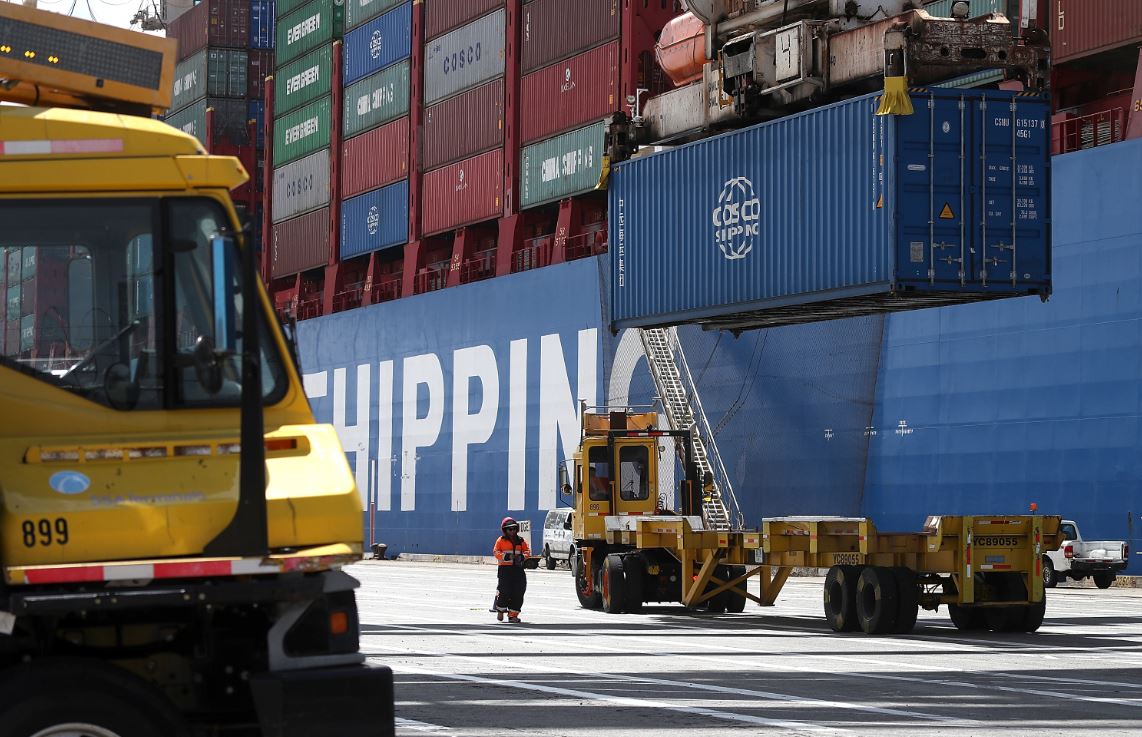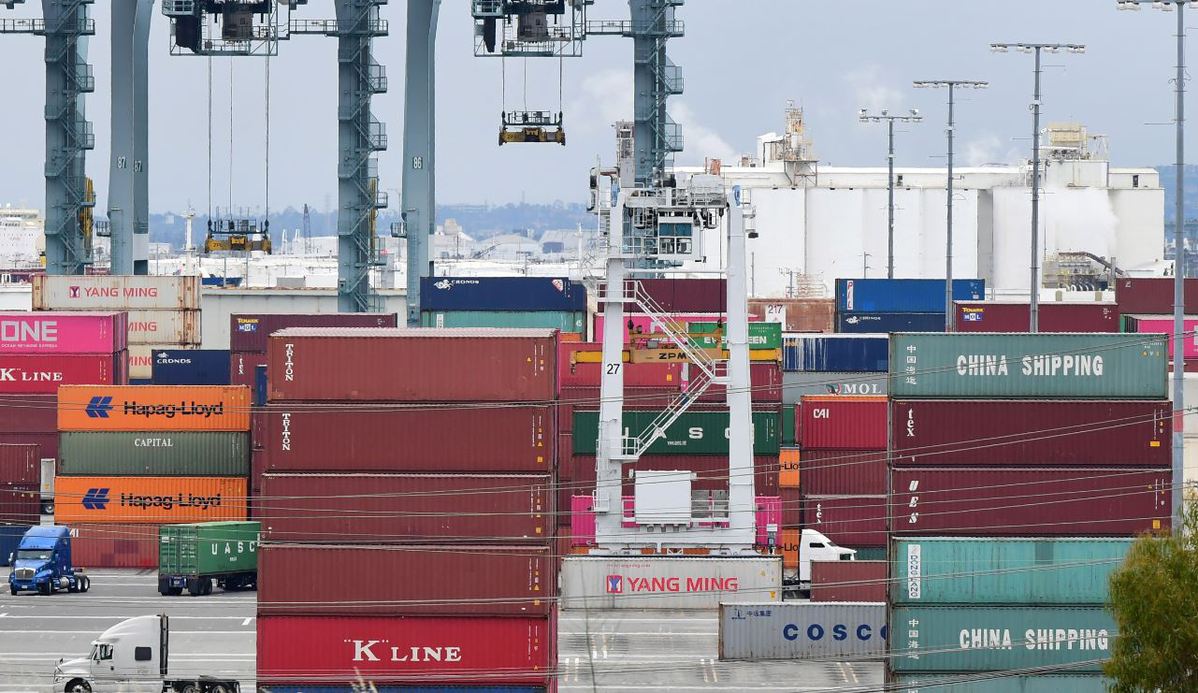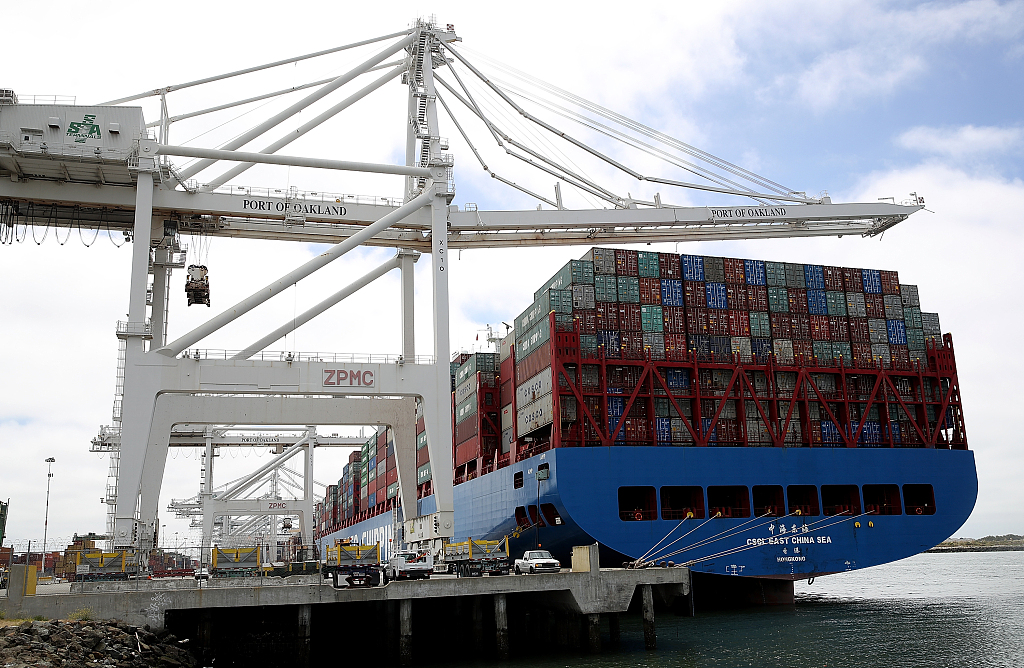Economic disputes will not come in the way of China's reform and opening-up efforts to attract investment

A container is unloaded from a ship owned by Hong Kong-based CSCL East China Sea at the Port of Oakland in California, the United States. [Photo/Agencies]
Over the past year, the US government has unilaterally provoked and escalated economic and trade friction with China, with negative impacts on bilateral economic, trade ties and global economic development. During this rare dispute, voices from home and abroad have made a lot of statements, making the cause and the facts clearer. China-US economic and trade friction involves a lot of issues, which need further clarification. The Chinese believe in truth and are not afraid of the clarifications.
• Is the Sino-US trade relationship a zero-sum game?
Some people in the US stirred up economic and trade friction with China with a solitary reason in mind - loss of profit to US firms and excessive gains for Chinese firms in bilateral trade, making the issue a threat to Washington's economic and even national security. This view, which is full of Cold War bias, reflects the hegemony and zero-sum game thinking. Is Sino-US economic and trade relation a zero-sum or win-win game? The answer is clearly both in theory and in practice.
In international economic cooperation, trade relations are based on mutually beneficial exchanges, rather than a zero-sum game in which one side benefits and the other loses. International trade can lead to optimized allocation of global resources, the common development of all economies involved and the common progress of human society. The history of international trade and the trade between China and the US have proved that such a practice is effective, and such practical experience has long been the basic principle of international economic study. Since the establishment of diplomatic relations between the two countries, bilateral trade in goods increased 252-fold, from less than $2.5 billion to $633.5 billion between 1979 and 2018.
In the past four decades, two-way investment has grown from almost zero to over $160 billion, making the two countries a vital investment partner for each other. The history of Sino-US economic and trade relations proves that both countries have benefited in industrial development and optimization. The trade relations have created a situation in which both parties won rather than one in which China progressed and the US lost out.
• Is US' insistence on "fair trade "really fair?
Some people in the United States accuse China of adopting unfair and unequal trade policies that have caused the US trade deficit with China. They tried to grab fair trade as a way to keep the moral high ground in public opinion. However, what is "fair trade"? Fairness is a matter of history. In international trade, due to the difference in the stages of development, specific conditions and interests from different countries, in order to make trade happen smoothly, the international community has formed trade rules through negotiations on an equal footing.
The "fair trade" some people in the US emphasized is not based on the international ruling but the premise of "America First "in order to secure its own interests. The so-called equal opening-up means that every country needs to comply with the exact same standards - tariffs and the industrial market entry permits - as the US. Such "absolutely fair" only seems fair on the surface. It ignores the developing countries' right to develop, and is highly unfair.
• Will unilateralism work?
Holding the mindset of "America First", some people in the United States who worship unilateralism put domestic law above international law, and use unilateral measures to suppress other countries and provoke economic and trade friction. They publicly stand against globalization and ignore the multilateral rules and the multilateral trading system by withdrawing from the Joint Comprehensive Plan of Action or Iran Nuclear Deal, the Paris Agreement on climate change, UNESCO, and the United Nations Human Rights Council etc ... Their unilateralist behavior and the slogan of "America First" have become a set of "inherently self-consistent logic".
On the surface, the promotion of unilateralism seems identical to anti-globalization and isolationism. However, this is only on one side. More importantly, some people in the United States pursue unilateralism because multilateralism of equal cooperation does not conform to their strategy of "America First" and intention of hegemonic dominance. Therefore, they are aggressively taking unilateral actions and suppressing other countries in international competition, in order to keep "America First" and prevent other countries from catching up.

Container trucks make their way past containers at the Port of Los Angeles on June 18, 2019 in California, the United States. [Photo/Agencies]
• Is technological hegemony by the US a right step?
Science and technology are the crystallization of human civilization and the commonwealth of human society. However, some Americans prefer to pursue a technological monopoly. To maintain its hegemonic position in the economic and technological fields, the US government has long imposed high-tech export controls on China.
During the trade friction, the US government has abused its state power to block Chinese tech companies on the grounds of national security, suppress the development of China's high-tech industries and squeeze China's high-tech products market. This attempt at technological hegemony will in no way succeed.
Science and technology are primary productive forces. The scientific and technological strength largely determines the economic strength and international competitiveness of a country, the changes in the balance of political and economic power in the world and the future and destiny of all nations. As science and technology play such an important role, the hegemonic thinking, monopoly practices and double standards of some people in the US have been vividly demonstrated in the field.
• Will the maximum pressure imposed on China take effect?
Using maximum pressure to achieve its goals is a trick frequently used by some in the United States for international negotiations called "the art of trading". Its main feature is using the means of multifaceted attacks and unlimited requirements while at the same time gaming against its opponent in multiple issues that cross different fields, and then resorting to selected compromising moves to achieve the goals of core interests, to maintain hegemony through power, and to defeat the opponent through bullying and deception. Some people in the US think that "maximum pressure" is extremely powerful, and decidedly useful when dealing with China.
Is the "maximum pressure" measure really effective? In dealing with some small and weak countries, the US government has arbitrarily waved the big stick of sanctions and relied on its power and maximum pressure to impose its own interests. Some countries, shadowed by the powerful economic and political pressure from the US, either because of a lack of overall strength or because of long-term dependence on the US, have been forced by the US to make compromises in accordance with the requirements of the US in negotiations, and they have to quiet down and let the US get what it wants. This is a situation that happens often and inevitably leads some people in the US to form the opinion that all countries, including China, will be afraid of the maximum pressure strategy and will certainly yield and surrender under their powerful pressure.
• Can trade protection make the "return of the manufacturing industry" to the US possible?
Since the Trump administration came to power, it has put forward the proposal of "buying US goods and hiring US workers", emphasizing the "return of the manufacturing industry". Some people in the US offered preferential policies to enterprises that came back to the US to set up factories. For those enterprises that moved their factories abroad, they were threatened with tariffs, forcing enterprises to return to the US for production. Can these trade protectionist practices really enable the US to achieve a return of the manufacturing industry?
Whether the return of the manufacturing industry can be achieved depends first on the reasons behind the outflow of manufacturing from the US.
From the perspective of the US domestic economy, its manufacturing outflow is determined by how the local economy works. In the process of economic globalization, US multinational companies have transferred more and more industries to developing countries to achieve maximum profitability. Through industrial transfer, they reduce costs, expand markets, divert pollution, and increase the profitability of capital. At the same time, more and more capital has left the real economic sector with lower profit margins, and turned to the financial sector to engage in financial speculation, leading to the hollowing out and virtualization of the US economy.
• Can economic and trade friction promote US economic prosperity?
Since 2019, the employment rate and the market value of the US stock market have remained high. In the first quarter, the actual GDP annualized quarter-on-quarter preliminary value was 3.2 percent. Since the introduction of economic and trade friction by the US against China, the US economy seems to be doing well. This has made some people in the US confident about constantly escalating trade friction with China. But to objectively evaluate the so-called prosperity of the US economy requires a comprehensive and rational analysis.
Based on some indicators, the US economy is prospering. However, whether it will continue to prosper depends on the state of capital accumulation. In the first quarter of 2019, the seasonally adjusted fixed-capital investment growth rate of the US private sector was only 1 percent, significantly lower than growth rates in 2017 and 2018. According to US official data, US durable goods orders fell 2.1 percent from the previous month in April 2019, surpassing the expected 2 percent decline. Shipments of core capital goods - a leading indicator of economic expansion - fell by 0.9 percent in April. From the perspective of development trends, economists are unsure about the prospects of the US economy. According to a recent survey released by the National Association for Business Economics, many economists predicted that the possibility of a recession in the US economy by the end of 2020 will almost double, mainly due to the US government's trade protectionist policies.

The Hong Kong based CSCL East China Sea container ship sits in a berth at the Port of Oakland on June 20, 2018 in California, the United States. [Photo/Agencies]
• Are additional tariffs in the interest of US citizens?
When the US government escalated economic and trade friction, a ridiculous argument of self-deception was floated by some in the US. It was claimed that "additional tariffs were good for the US". From last year's "trade war is good", it has now come down to that China is paying huge tariffs to the US ... These huge taxes will be directly handed over to the US Treasury, and tariffs will bring more wealth to the US, even more than traditional trading. This claim goes completely against the common sense of economics. It is just the rhetoric of some in the US to hide the dangers of trade wars and fool people.
As far as the essence of trade protectionism in capitalist countries goes, a great economist has revealed that the protective tariff system that the capitalist class implements in the name of the state and the nation is merely a means of artificially "creating factory owners, exploiting independent workers and capitalizing the production materials and living materials of the people".In fact, while trade protectionism harms the interests of other countries, it also harms the interests of US citizens. It is a redistribution of interests that benefits only a few large monopolies in the US.
Trade friction harms the interests of ordinary US consumers. A large part of China's exports to the US are ordinary consumer goods, and the price elasticity of demand is small. Therefore, according to the tax-transfer principle, when the US imposes tariffs on Chinese goods, most of them will eventually be passed on to US consumers. A study from Goldman Sachs, a famed investment bank, believes that after the US government imposed tariffs on Chinese goods last year, Chinese exporters did not lower their prices "to compete in the US market". Therefore, tariff costs were mainly passed on to US companies and households, resulting in a rise in consumer prices. It has pushed up the core inflation rate in the US.
• Can Sino-US trade friction hurt the Chinese economy?
The US has continuously escalated Sino-US trade friction and used trade bullying and various other measures against China, which will undoubtedly adversely affect the production and operation of Chinese enterprises and people's consumption and expectations, and increase downward pressure on the economy. However, if we take a long-term, comprehensive and fundamental view to calmly and objectively examine it, rather than being caught in the short-term economic fluctuations or the consideration of gains and losses for the moment, we can draw the conclusion that the impact will be generally controllable and positive. The good trend is unchanged, the comprehensive advantages are obvious, and the means of regulation are sufficient. There are more opportunities than challenges.
The impact will be generally controllable. In 2018, the dependence of China's growth on exports was only 18.24 percent, and the impact of exports on China's economic growth is gradually decreasing. Since the beginning of this year, despite the slowdown in world economic growth and international trade, China's economy has started well, and the main economic indicators have remained within a reasonable range. China is optimizing its economic structure, changing its development mode, and improving its quality and efficiency. The Chinese economy is well poised to maintain the healthy trend of stable growth.
• What is China's position and attitude toward Sino-US economic and trade friction?
Since some people in the US provoked the Sino-US economic and trade friction, the two sides have increasingly taken divergent approaches to this issue. That is, should it be taken as a zero-sum game or based on mutual benefit, being addressed through confrontation or cooperation? Should the countries stay enclosed or open up, maintaining a monopolistic or competitive market? Should the countries stick to unilateralism or multilateralism? All these differences are underpinned by the ultimate question of whether the world is governed by the old way of hegemonism, or a new approach by building a community with a shared future for mankind. China's position and attitude toward these major fundamental issues is clear, firm and consistent.
Faced with the economic and trade friction provoked and escalated by some people in the US, China does not want a trade war. However, the country is not afraid of a trade war and will fight one if necessary. Proceeding from safeguarding the common interests of the two countries and the world trade order, China has responded to the concerns raised by the US with great sincerity. China overcame various difficulties, proposed practical solutions, and conducted 11 rounds of high-level economic and trade consultations with the US, which demonstrated China's sincere desire of not fighting a trade war. However, the US has continuously challenged China's bottom line and overstepped the red line of norms governing international relations, attempting to sacrifice China's rights to development and even damaging China's sovereignty and dignity.
No matter how the situation develops, China runs its own affairs well. The fundamental way to deal with economic and trade friction is to develop itself through reform and opening-up, which China will continue to deepen.
The above are excerpts from an opinion piece in Qiushi Magazine.


